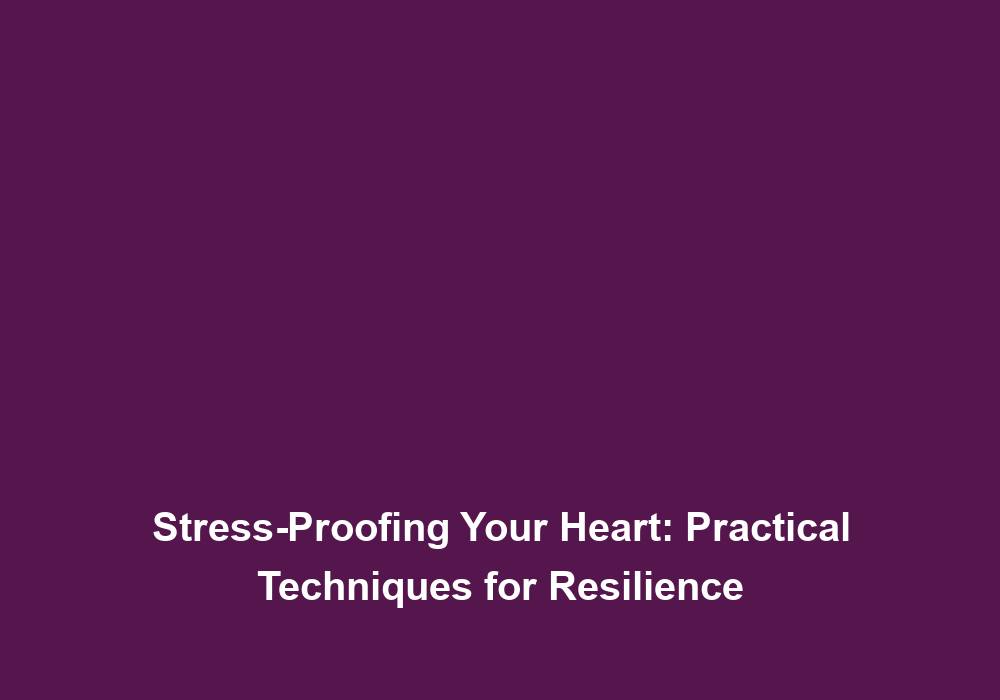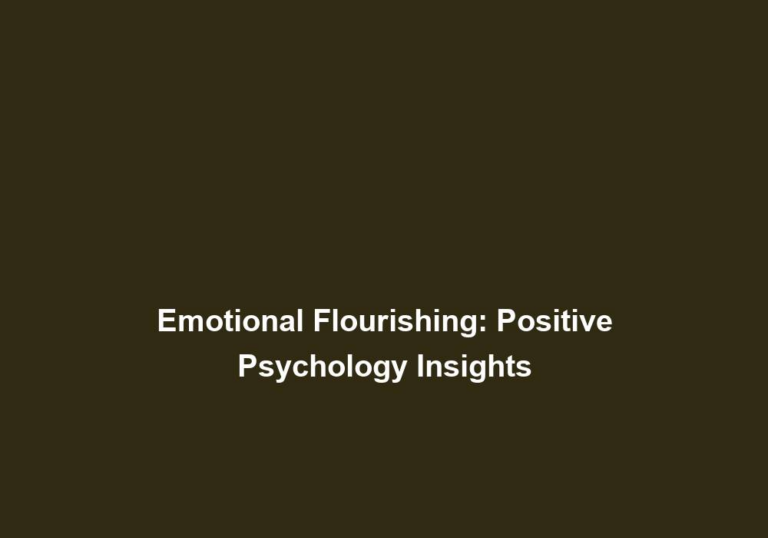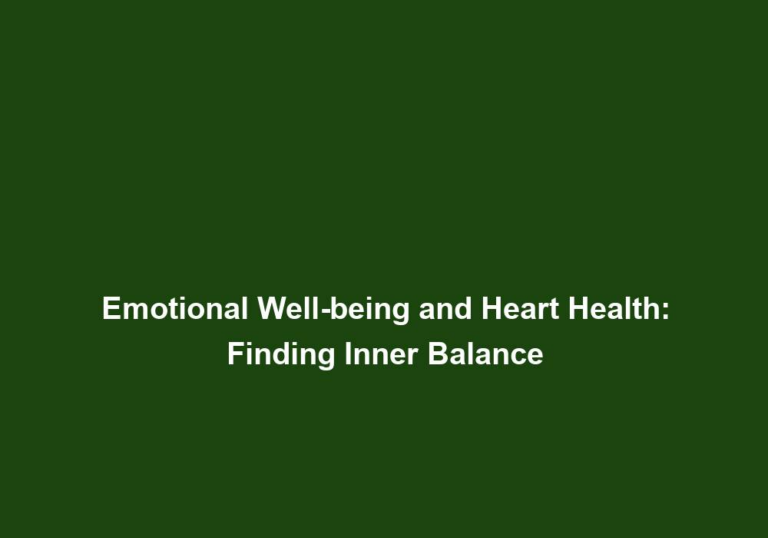Stress-Proofing Your Heart: Practical Techniques for Resilience
In today’s fast-paced and demanding world, stress has become a prevalent issue that can significantly impact our overall well-being. Chronic stress not only affects our mental health but also takes a toll on our physical health, particularly our heart. However, by implementing practical techniques and adopting healthy habits, we can effectively stress-proof our hearts and enhance our resilience. In this article, we will explore various strategies to manage and reduce stress, promoting a healthier heart and a happier life.
Understanding the Impact of Stress on the Heart
Before delving into stress management techniques, it is crucial to comprehend the detrimental effects that stress can have on our cardiovascular system. When we experience stress, our body releases stress hormones like cortisol and adrenaline, triggering a fight or flight response. This physiological reaction increases heart rate, raises blood pressure, and constricts blood vessels. These changes put extra strain on the heart and can contribute to the development of heart disease.
Prolonged exposure to these stress hormones can lead to chronic inflammation, arterial damage, and an increased risk of heart disease. Chronic inflammation can contribute to the formation of plaques in the arteries, narrowing them and reducing blood flow to the heart. Arterial damage can also make it easier for these plaques to rupture, leading to a heart attack. Therefore, taking proactive measures to combat stress is essential for maintaining heart health.
Prioritizing Self-Care
To stress-proof your heart, it is crucial to prioritize self-care. By making time for activities that nourish your mind, body, and soul, you create a strong foundation for resilience. Here are some self-care practices that can significantly reduce stress levels:
1. Engage in Regular Physical Exercise
Engaging in regular physical exercise is one of the most effective ways to combat stress and improve heart health. Exercise helps release endorphins, which are natural mood boosters, and lowers stress hormones. Aim for at least 30 minutes of moderate-intensity exercise most days of the week, such as brisk walking, jogging, or cycling. Regular exercise not only strengthens the heart and improves cardiovascular fitness but also promotes overall well-being.
2. Practice Mindfulness Meditation
Mindfulness meditation has gained significant popularity in recent years due to its proven benefits in reducing stress and promoting emotional well-being. By focusing on the present moment and observing your thoughts without judgment, you can cultivate a sense of calmness and resilience. Consider incorporating mindfulness meditation into your daily routine, even if it’s just for a few minutes. This practice can help reduce anxiety, improve sleep quality, and enhance overall mental well-being.
3. Get Sufficient Sleep
Adequate sleep is crucial for maintaining both physical and mental health. Lack of sleep or poor sleep quality can increase stress levels and elevate the risk of heart disease. Aim for 7-9 hours of quality sleep each night by establishing a regular sleep routine, creating a comfortable sleep environment, and avoiding stimulating activities before bedtime. Prioritize sleep as an essential part of your self-care routine, as it allows the body and mind to rest and rejuvenate.
4. Practice Deep Breathing and Relaxation Techniques
Deep breathing exercises and relaxation techniques, such as progressive muscle relaxation or guided imagery, can help activate the body’s relaxation response and reduce stress. Incorporate these techniques into your daily routine, especially during stressful situations. Deep breathing exercises involve taking slow, deep breaths, filling your lungs with air, and then exhaling slowly. This practice helps calm the nervous system, lower heart rate, and promote a sense of relaxation. Other relaxation techniques, like progressive muscle relaxation, involve tensing and then releasing different muscle groups to promote physical and mental relaxation.
Adopting Healthy Lifestyle Habits
In addition to self-care practices, adopting healthy lifestyle habits can significantly contribute to stress-proofing your heart. Here are some valuable habits to consider:
1. Follow a Heart-Healthy Diet
Consuming a balanced diet rich in fruits, vegetables, whole grains, lean proteins, and healthy fats is essential for maintaining heart health and reducing stress. A heart-healthy diet can provide essential nutrients, antioxidants, and fiber that support cardiovascular health. Avoid or limit the intake of processed foods, sugary snacks, and excessive caffeine, as they can contribute to inflammation and increase stress levels. Opt for nutrient-dense foods that nourish the body and support overall well-being.
2. Limit Alcohol and Quit Smoking
Excessive alcohol consumption and smoking are detrimental to heart health and can exacerbate the effects of stress on the cardiovascular system. Alcohol can increase blood pressure and contribute to the development of heart disease. Smoking damages blood vessels, reduces oxygen supply to the heart, and increases the risk of heart attack and stroke. It is crucial to limit alcohol intake to moderate levels and consider quitting smoking altogether to reduce the risk of heart disease and enhance resilience.
3. Stay Socially Connected
Maintaining strong social connections can provide immense emotional support and help alleviate stress. Engage in regular social activities, spend quality time with loved ones, and seek support from friends and family when needed. Social support can help buffer the negative effects of stress and promote a sense of belonging and well-being. Whether it’s joining a club or organization, volunteering, or simply reaching out to friends, make an effort to foster meaningful connections in your life.
4. Practice Time Management
Managing your time effectively can significantly reduce stress levels and promote a sense of control and accomplishment. Prioritize tasks, delegate when possible, and avoid overcommitting yourself. Remember to set aside time for relaxation and rejuvenation. By managing your time wisely, you can create a balanced lifestyle that allows for self-care, leisure activities, and stress reduction. Consider using tools like to-do lists, calendars, and scheduling apps to help you stay organized and make the most of your time.
Seeking Professional Help
While the aforementioned techniques can be highly effective in stress-proofing your heart, it is essential to acknowledge that seeking professional help is sometimes necessary. If you find that stress is severely impacting your day-to-day life, don’t hesitate to reach out to a mental health professional or your primary healthcare provider. They can provide personalized guidance, support, and additional strategies to manage stress and enhance resilience. Seeking professional help is a sign of strength and a proactive step towards improving your well-being.
By implementing these practical techniques, prioritizing self-care, and adopting healthy lifestyle habits, you can effectively stress-proof your heart and enhance your overall well-being. Remember, small steps taken consistently can make a significant difference in managing stress and promoting a healthier, happier life. Take control of your heart health today and embark on a journey towards resilience and well-being.
This article is written in Markdown format.







